The Lasting Dangers of Unexploded Israeli Cluster Bombs
Democracy Now! via sam | 23.08.2006 23:11 | Analysis | Anti-militarism | Repression | World

Exploded
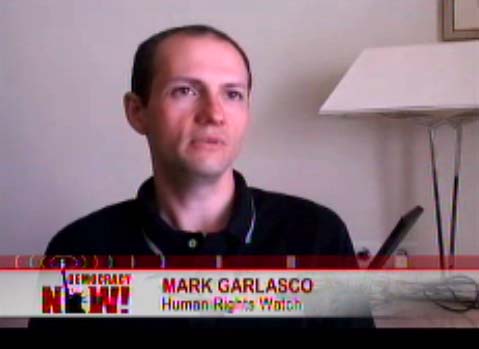
Unexploded
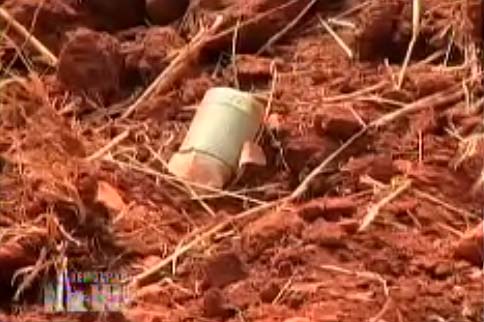
Unexploded
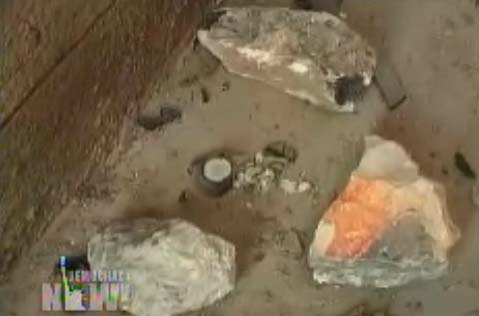
Unexploded
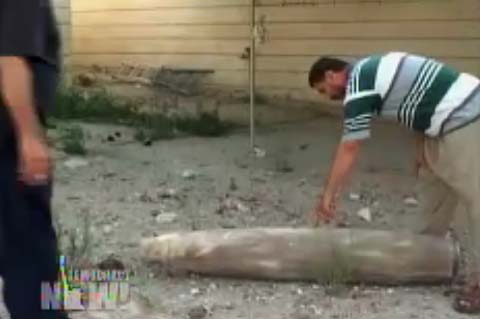
Unexploded
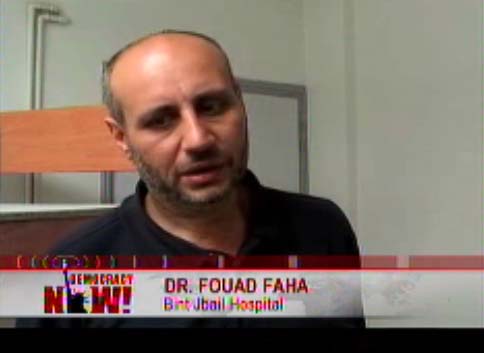
Unexploded
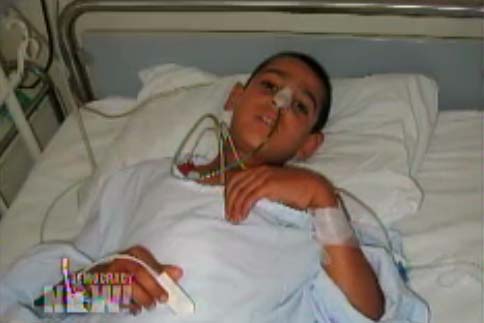
Exploded
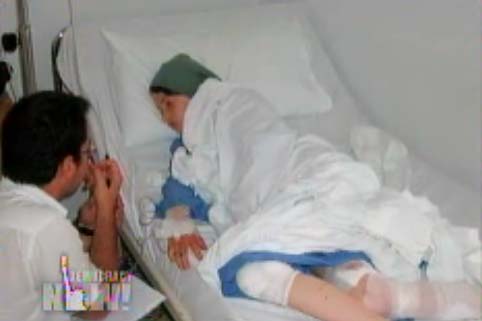
Exploded
Since a UN-brokered ceasefire came into effect nine days ago, tens of thousands of displaced Lebanese civilians have returned to their homes in southern Lebanon. While Israel's bombing of the south may have ended, it left a deadly legacy in its wake: unexploded cluster bombs. Israel dropped thousands of cluster bombs on at least one hundred and seventy villages in south Lebanon during its month-long war against Hezbollah. The bomblets that failed to explode are now a deadly trap for civilians.
Democracy Now's Ana Noguiera is in southern Lebanon. She filed this report:
AMY GOODMAN: Democracy Now!'s Ana Nogueira went to South Lebanon. She filed this report.
ANA NOGUEIRA: When Bilal Beydoun returned to his village of Bint Jbeil one week after the ceasefire, he discovered the war not over.
BILAL BEYDOUN: I found an unexploded bomb on my front porch and an unexploded missile on my back porch. And I don't know where I’m going to sleep tonight. I mean, I can't even go in my backyard, because the grass is high, and you just can't go back there. You don't know where you're going to step. Your next step might be your last step.
ANA NOGUEIRA: The United Nations interim force in Lebanon estimates that Israel dropped approximately 150,000 bombs during the 34-day military offensive. Many of these remain unexploded, even as villagers return home to start clearing away the rubble. The large unexploded missiles, while extremely threatening, are easier to find. It is the estimated 15,000 cluster bomb munitions, each carrying anywhere from 80 to 600 small bomblets, that pose the most immediate threat. Mark Garlasco is the senior military analyst for Human Rights Watch.
MARK GARLASCO: The use of submunitions here in Lebanon really is at a crisis point. We're seeing the contamination levels far higher than many areas during the Iraq war. Interestingly, though, we've also seen the exact same cluster bombs used here that were used in Iraq. And these same weapons were the main killers of civilians during the war in Iraq in 2003. We've seen dud rates from the American submunitions, which are not manufactured particularly well, on paper 14%, but in the field 30% to 40%. So the American stuff is much, much worse than the Israeli-manufactured, and primarily the Israelis have been using American weapons.
ANA NOGUEIRA: 21 people have been injured and four killed from these unexploded ordinances in the weeks since the ceasefire took effect. In Nabatiya, an 11-year-old boy was killed after stepping on an unexploded bomb in front of his house. His father, running out to help him, stepped on another and died 72 hours later. Not even the hospital grounds, where many of these patients are being taken, are safe. Doctor Fouad Faha shows us around the hospital in Bint Jbeil, where we counted six visible unexploded devices, including a 500-pound missile in the backyard.
DR. FOUAD FAHA: The day before yesterday, we had three kids who were playing with one of these bombs, and it exploded among them, and all of them got injured. One of them has all his intestines out. The other two girls were badly injured in their chest. We transferred them to Saida, because we didn’t finish -- the operation room wasn't really ready, because of what happens over here.
ANA NOGUEIRA: Human Rights Watch says Israel could face legal action for their use of these types of munitions in civilian areas. Although the weapons are not themselves banned, the Geneva Conventions prohibits their use in civilian areas. This is Nadim Houry, head researcher of Human Rights Watch in Lebanon.
NADIM HOURY: I mean, there are very serious legal ramifications. By using these cluster munitions in areas where there are civilians, Israel not only endangered people at the time of the attack, but they created minefields that villagers are coming back to today. And we have counted over 30 villages so far, where people are coming back to their homes to find unexploded ordinances in their living room, in their patios, on their rooftops, and in their cars. This is truly very dangerous, and it is a violation of the Geneva Conventions to do so.
ANA NOGUEIRA: Andrew Gleeson of the Mine Action Group has been working to de-mine the region. He estimates it will take one year to 18 months for complete clearance of populated areas. But that does not include farms and fields, which are also littered with these bombs.
ANDREW GLEESON: At the moment, we’re prioritizing people, houses and roads, and later we will target fields of agriculture that require clearance as well. The agricultural land is a concern for two reasons: one, people might go into the agricultural land without knowing there’s munitions there; and the second is, people may take the risk. We heard some tobacco fields are contaminated. It's harvesting time for tobacco fields, and that means people might go in and recover that tobacco and take the risk, because it's part of their economy.
ANA NOGUEIRA: In every town, anxious citizens toured us around their homes, where so many of these bombs lied scattered amongst the ruins. They mark them off with stones and red spray paint in the hopes of avoiding more injuries.
LEBANESE VILLAGER: You can’t walk in this area. You can see all the bombs around you. You might step on one of these. You can see it. Boom! Kill you.
ANA NOGUEIRA: For Democracy Now!, this is Ana Nogueira with Jackson Allers in Lebanon.
AMY GOODMAN: Ana reported, after she filed the story, that the number of casualties from unexploded ordinances has risen to eight people killed and at least 25 wounded. For more on the story, we're joined by longtime peace activist Caoimhe Butterly. She's in southern Lebanon, where she's helping with rebuilding efforts and working to raise awareness about the leftover cluster bombs. We welcome you to Democracy Now!, Caoimhe Butterly.
CAOIMHE BUTTERLY: Good morning, Amy.
AMY GOODMAN: It's good to have you with us. Can you tell us about the situation there and exactly what you're doing?
CAOIMHE BUTTERLY: We’re presently based in a village called Aita al-Shaab, which is near to Bint Jbeil, which was sort of scene of some of the heaviest fighting during the invasion. I’m working with a sort of grassroots activist and volunteer network called Samidoun, which is based out of Beirut and comprises over 400 mainly volunteers, although we have sort of teams of doctors and engineers, etc., working with us.
And our main function at the moment in Aita al-Shaab is the distribution of aid and just trying to see that it's distributed sort of equally and fairly in surrounding villages, as well as doing workshops and sort of role-playing activities with children and with different both Lebanese and international groups who are trying to de-mine the area, in terms of raising awareness about the situation in terms of cluster bombs and just trying to teach children how to identify the different unexploded ordinances and to stay away from them and how to mark them, as well.
AMY GOODMAN: Caoimhe, we also have reports that an Israeli soldier was killed and three others wounded in southern Lebanon, when their tank drove over a landmine believed to have been placed there by the Israeli military before they pulled out in 2000.
CAOIMHE BUTTERLY: I mean, the situation in the south of Lebanon is, you know, that this policy of using ordinances, which are designed for maximum impact and maximum civilian deaths, that this is continuing, that when the Israelis left in 2000, that obviously there were thousands of landmines planted, and that this has made life impossibly difficult, but particularly for farmers, and that's something that a lot of families are saying, you know, that they've already lost the tobacco harvest this year, because they were under siege and unable to harvest their crops, but also, now fields are completely unsafe for them to enter into.
But a lot of these villages are compromised of subsistence farming families, you know, so this is again how people will probably be either wounded or killed, you know, of course, economically to harvest their crop and basically brave the dangers of the countryside, just littered with cluster bombs. The school that we're working out of, actually, with aid distribution, has a cluster bomb in one corner of it and three others on the roof. The roof is the only spot where you can get phone reception, you know, in the entire sort of village, so it’s -- that's one example. But there are, as mentioned in Ana’s report, cluster bombs in people's kitchens, living rooms, backyards, schools, etc., all over the place.
AMY GOODMAN: Caoimhe Butterly, you're particularly known for working with children, longtime peace activist, Irish peace activist. You spent five years working with refugees in Jenin. You were shot there by Israeli soldiers when you were trying to lead a group of Palestinian children to safety. Can you specifically talk about children right now and these unexploded ordinances, these unexploded bombs?
CAOIMHE BUTTERLY: I think what we've seen in a lot of the villages that we've been touring is, I mean, that there is -- it's hard to express really, I think, people's sentiments at the moment, but there is, Amy -- there’s this feeling of great pride. And I wouldn't call it a victory, but at least, you know, people having resisted, on all levels, I think, militarily and socially and politically, and sort of displaced people, you know, sort of braving the discomforts of being displaced, but that the fact that Lebanon was not reoccupied. But there is also a very crushed, traumatized sort of infrastructure and people. And we're seeing that more and more in children. I think like ten-and-up-year-olds are, you know, quite defiant and brave, and they sort of talk about having resisted the occupation or the invasion and occupation, but smaller children are just obviously traumatized.
There were three children wounded in Aita al-Shaab, which is the village where we're based, a few days ago. One of them was seriously wounded and is still in intensive care in Sour in Tyre. But it's something that the children are very aware of, you know, and I think the sort of vulnerability that has impacted on their life, you know, having seen their family members killed and their homes destroyed, etc., is further enhanced by their mothers telling them -- and their mothers are terrified, the mothers we speak to -- but really that no place is safe to play. And they know that, that every time they go out, that there is no safety.
The last few nights that we’ve spent in the village, there have been tanks moving up and down the borders. There's been drones and helicopters. And people are seeing this as deliberate psychological intimidation, as a way of really reminding them that they're being watched, that they're still not safe. And people are terrified. Samidoun, the group I’m working with, was also working with displaced people in Beirut, and some of the nights that we were there, whenever there was an explosion or a sonic boom sort of above the camp, there would be sort of screaming and fainting, and, you know, there’s this deep, deep trauma and a deep sense of vulnerability. But again, I mean, people have to get on with their lives, but the situation is pretty intolerable. There's no running water, no electricity, very basic sort of food stuff, in terms of aid getting in, you know, and the threat really of the Israelis either coming back in or gratuitously sort of targeting Aita al-Shaab or the villages on the border again.
AMY GOODMAN: Caoimhe Butterly, I want to thank you for joining us from southern Lebanon. Caoimhe Butterfly, longtime peace activist, has spent time in Iraq, a long time in West Bank, and now spending time in southern Lebanon working with children and refugees who have returned back to their homes.
 http://www.democracynow.org/article.pl?sid=06/08/23/1413209
http://www.democracynow.org/article.pl?sid=06/08/23/1413209 Related:
UPDATE-- Petition: We Demand an International Criminal Tribunal for Israel
This Petition demands that The United Nations General Assembly immediately establish an International Criminal Tribunal for Israel to prosecute the Israeli Prime Minister Olmert, Defense Minister Peretz, Chief of Staff Halutz and Israel’s other top generals and war criminals for their infliction of international war crimes, crimes against humanity and genocide against the Peoples of Lebanon and Palestine.
 http://adelaide.indymedia.org/newswire/display_any/19861
http://adelaide.indymedia.org/newswire/display_any/19861 Human Rights Watch Accuses Israel of War Crimes
AMY GOODMAN: Peter Bouckaert, we want to thank you very much for being with us, Emergencies Director at Human Rights Watch. He's speaking to us from Beirut. The report that Human Rights Watch has just put out is called "Fatal Strikes: Israel's Indiscriminate Attacks Against Civilians in Lebanon."
 http://adelaide.indymedia.org/newswire/display_any/18510
http://adelaide.indymedia.org/newswire/display_any/18510 Peace, Propaganda, and the Promised Land: Documentary Examines US
Media Coverage of the Israeli Palestinian Conflict
How has the US media covered the conflict in the Middle East? We play an excerpt of the documentary “Peace Propaganda and the Promised Land: U.S. Media & the Israeli-Palestinian Conflict.” The film was directed by Bathsheba Ratzkoff and Sut Jhally of the Media Education Foundation.
 http://www.democracynow.org/article.pl?sid=06/08/03/1351216
http://www.democracynow.org/article.pl?sid=06/08/03/1351216 Seymour Hersh: U.S. Helped
Seymour Hersh: U.S. Helped Plan Israeli Attack, Cheney "Convinced" Assault on Lebanon Could Serve as Prelude to Preemptive Attack on Iran
Investigative journalist Seymour Hersh reports in this week's issue of the New Yorker that Israeli officials visited the White House earlier this summer to get a "green light" for an attack on Lebanon. The Bush administration approved, Hersh says, in part to remove Hezbollah as a deterrent to a potential US bombing of Iran.
 http://www.democracynow.org/article.pl?sid=06/08/14/1358255
http://www.democracynow.org/article.pl?sid=06/08/14/1358255
Democracy Now! via sam
Comments
Hide the following 7 comments
400 Aust militants head for Afghanistan
23.08.2006 23:52
About 400 Australian militants bound for Afghanistan were farewelled by family and friends at Darwin Airport last night?
=============================
Former ambassador accuses Australia of pro-Israeli stance
A retired ambassador says Australia has lost respect in the Middle East because of its uncritical defence of Israel.
=============================
Three Lebanese soldiers killed clearing shells
Three Lebanese soldiers were killed on Wednesday as they tried to clear unexploded Israeli shells in southern Lebanon, a senior security official says.
=============================
Israel signs contract for nuclear capable submarines: reports
Israeli newspaper reports say Israel has signed a contract with Germany for two new U-boats capable of launching nuclear weapons.
=============================
Amnesty accuses Israel of war crimes
Israel should be investigated for "grave violations" of human rights law, Amnesty International says, accusing the Jewish state of "war crimes".
Fred
Death Rays
23.08.2006 23:52
There is lack of resources to undertake the underlying examinaiton and tests as to the nature of weapons being used by Israel in Lebanon. In the absence of firm evidence, some worthwhile avenues of investigation have been suggested .
Last May "Ray News 24"- an Italian TV Channel- broadcast a report by journalists in Iraq concerning the use of a new type of experimental weapon. The latter his consists of rays of short electro-magnetic waves similar to the waves produced by the microwave devices used domestically.
This type of ray is aimed at the human target. When the person is hit, the nerve ends under his skin are affected leading to paralyzis of the nervous system. Moreover, the micor-wave raise the body temperature through heating the water in the cells. Used on live peopel, it's exactly the same process as the the home used microwaves!
The report (that is now being investigated by the Strategic Research Institute in California), a private independent research center, explains that these types of weapons causes the disassembling of the target body parts and the appearance of what looks like burns in different parts of their bodies, while doctors could not find any solid parts of bombs.
Bret Wagner, the head of the Research Insitutute has called this weapon the Death Ray. Wagner also points in a published article that: "this weapon works in the speed of light and is able to hit targets from very long distance and expose lives to the microwaves that leads to its explosion.." This would explain the great damage that doctors have witnessed in examining the corpses.
Yet the TV report on Iraq talks about shrinkage of the body mass of the corpse resulting from the use of this weapon. Wagner also attributes the melted and distorted feature of the cars and buses that were present on the battle scene to the exposure of the electromagnetic rays.
x-men
john hoWARd's abc's attack on Iran
24.08.2006 03:06
Congress report faults US intelligence on Iran
A US congressional report says the country's intelligence community is ill-prepared to assess Iran's nuclear weapons capabilities and its intentions for developing weapons of mass destruction.
World powers want Iran to suspend nuclear work before talks
World powers are ready to respond to Iran's call for talks over its nuclear ambitions but only if it first suspends uranium enrichment, France said on Wednesday.
Wednesday, August 23, 2006.
Iran calls for talks over nuclear stand-off
Iran called for talks as it delivered its response to a deal aimed at ending a long-running nuclear stand-off but it did not say whether it had met the demands of the international community.
Iran, interest rate fears hold markets down
Mainstream US stock prices have closed just a touch lower, with US investors wary after Iran's offer of further discussions over its nuclear program.
Tuesday, August 22, 2006.
Iran replies to nuclear incentives offer
Iran has handed over its reply to an incentives package by world powers aimed at allaying Western fears that Tehran seeks to build atomic bombs, Iran's state-run television reports.
Monday, August 21, 2006.
Iran to continue its nuclear work, Ayatollah says
Iran's supreme leader Ayatollah Ali Khamenei says that Iran will press on with its nuclear work despite a United Nations (UN) Security Council resolution calling for a freeze.
Sunday, August 20, 2006.
Iran rejects halting nuclear work
Iran says it will not suspend uranium enrichment, ruling out the main demand in a nuclear package backed by six world powers.
Parrot Press
Child killed by militants in Afghanistan
24.08.2006 08:52
==================================
Australian Prime Sinister announces militants numbers boost
The Australian Prime Sinister has announced a big increase to the size of army militants.
==============================
Militant Boost to Cost 10 Billion?
The Prime Sinister has announced a big increase to the size of army militants. Militant Boost to Cost 10 Billion?
10 Billion is enormous add that to this....
Military Spending Out of Control
Under the Howard Government Australian military spending is ballooning out of control. Up from an already massive $10.56 Billion Dollars in 1995-96 to an unbelievable $19.6 Billion dollars a year! This is an increase of 37% in real terms. Australia is now the 15th biggest military spender in the world!!!!
Australian government to deploy 150 extra troops to Afghanistan
In a TV interview on the Nine Network, Defence Minister Brendan Nelson recently revealed: “The prime minister, in his long term vision for Australia and the Australian Defence Force, has indicated to me that he thinks it important that we consider the possibility and the options for increasing the size of our defence force, and in particularly the army. Over the next few months I’ll be working through those ideas.”
More money for war crimes and less money for social services, nelson?
But what a load of rubbish again because Lib/Lab sold us out and there is no party opposed to these illegal and degrading wars and crimes and acts of aggression committed against the indigenous Iraqi and Afghani people!
=================================
Australian Prime Sinister to sell Army's 'violence'
The Australian Prime Sinister says it will be tough to recruit enough soldiers to reach the target set out under the Federal Government's plan to make the army larger.
=================================
Parrot Press
Apocalypse Now:
24.08.2006 10:57
Middle East, Part Four: Target Lebanon: The Untold Story
takingaim
100 million explosive duds
24.08.2006 15:10
Danny
Amnesty International Accuses Israel
25.08.2006 01:06
Amnesty International has accused Israel of committing war crimes for deliberately targeting civilian infrastructure in Lebanon. In a report released yesterday, the human rights group criticized Israel for destroying homes, bridges, roads, water treatment plants and fuel tanks.
Democracy Now!